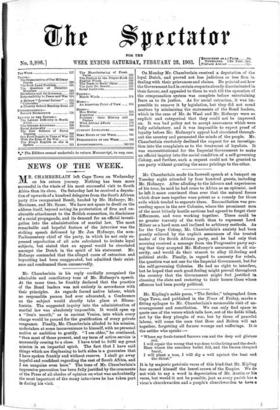Mr. Chamberlain made his farewell speech at a banquet on
Tuesday night attended by four hundred guests, including Mr. Hofmeyr. After alluding to the labours and experiences of his tour, he said he had come to Africa as an optimist, and he left it more convinced than ever that the natural forces which draw men together were potent as a remedy for those evils which tended to separate them. Reconciliation was pro- ceeding apace in the new Colonies, where the prominent men of the most bitterly hostile sections had agreed to forget their differences, and were working together. There could be no greater travesty of the truth than to represent Lord Milner as a hard man and inclined to arbitrary methods. As for the Cape Colony, Mr. Chamberlain's anxiety had been greatly relieved by the explicit assurances uf .the trusted leader of the South African party, and he had only that morning received a message from the Progressive party say- ing that they accepted Mr. Hofmeyr's assurances in all sin- cerity, and would do their utmost to allay ill-feeling and political strife. Finally, in regard to amnesty for rebels, the question was not one for the Imperial Government, but for the self-governing Colonies. He had no right to interfere, but he hoped that such good-feeling might prevail throughout the country that the Government might feel justified in cleaning the slate and restoring to their homes those whose offences had been purely political.










































